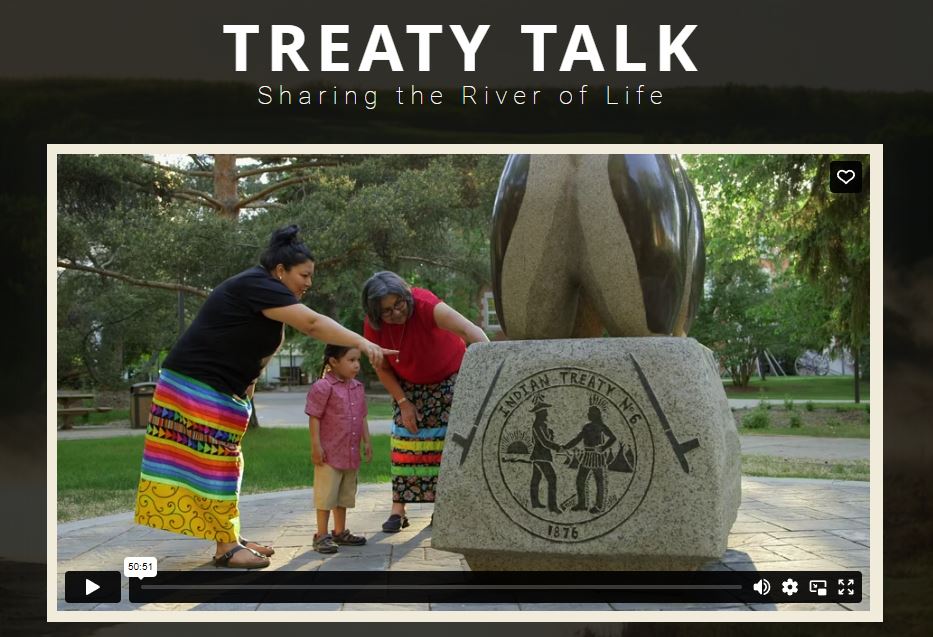Videos:
Wahkohtowin: Cree Natural Law
Discussions by four Cree elders; George Brertton, Fred Campiou, Isaac Chamakese and William Dreaver, give insight into the differences between Canadian law and Cree Natural Law and why Natural Law is needed in contemporary society. Wahkohtowin means “everything is related.” It is one of the basic principles of Cree Natural Law passed through language, song, prayer, and storytelling. The elders explain that by following the teachings of Wahkohtowin individuals, communities and societies are healthier.
Home Fire - Ending the Cycle of Family Violence
Home Fire explores family violence and restorative justice from an Aboriginal perspective. Featuring commentary from Elders, community leaders, and members of the western justice system, Home Fire examines the colonization of Canada, historic trauma, the western justice system and grassroots healing programs in Aboriginal communities.
Treaty Talk - Sharing the River of Life
Treaty Talk – Sharing the River of Life is a 50 minute teaching tool to better understand our collective responsibility to treaty. The purpose of this video is to build understanding, allyship and bridges for better relationship and work together. This film, through the sharing of a traditional Cree understanding on natural law and treaty, will explore and model how Indigenous nations and non-Indigenous allies in Canada can come together to transform racism and discrimination at a local and systemic level and to build a future of mutual benefit.

What is reconciliation?
Is hanging Indigenous art in an office “reconciliation?” In this web series called “First Things First,” Indigenous experts take a look at what it really means to reconcile after generations of systemic racism against Indigenous peoples.
The video content spans topics about land, identity, life and politics, and helps to promote learning and deeper understanding of the issues impacting Indigenous communities. Our goal is to amplify Indigenous voices in Ontario and surface truths, one video at a time. We seek to build relationships and ask the questions you’re afraid to ask while sharing cultural pride, humour, and the many facets of Indigenous identities.
Courses:
Indigenous Canada - MOOC
Indigenous Canada is a 12-lesson Massive Open Online Course (MOOC) from the Faculty of Native Studies that explores the different histories and contemporary perspectives of Indigenous peoples living in Canada.
Faculty of Native Studies
The Faculty of Native Studies offers continuing education programming for a broad range of professionals and lifelong learners. Our courses have been designed to build specialized and enduring skills and competencies for application in a wide array of professions and settings.
National Reports:
Reclaiming Power and Place
The National Inquiry’s Final Report reveals that persistent and deliberate human and Indigenous rights violations and abuses are the root cause behind Canada’s staggering rates of violence against Indigenous women, girls and 2SLGBTQQIA people. The two volume report calls for transformative legal and social changes to resolve the crisis that has devastated Indigenous communities across the country.
Royal Commission on Aboriginal Peoples
The Royal Commission on Aboriginal Peoples (RCAP) was established by Order in Council on August 26, 1991, and it submitted in October 1996 the Report of the Royal Commission on Aboriginal Peoples. The RCAP was mandated to investigate and propose solutions to the challenges affecting the relationship between Aboriginal peoples (First Nations, Inuit, Métis Nation), the Canadian government and Canadian society as a whole.
Truth and Reconciliation Commission
The Indian Residential Schools Settlement Agreement, the largest class-action settlement in Canadian history, began to be implemented in 2007. One of the elements of the agreement was the establishment of the Truth and Reconciliation Commission of Canada to facilitate reconciliation among former students, their families, their communities and all Canadians.
UN Declaration On The Rights Of Indigenous Peoples
The United Nations Declaration on the Rights of Indigenous Peoples (UNDRIP) was adopted by the General Assembly on Thursday, 13 September 2007
Further Reading:
No Surrender: The Land Remains Indigenous (Sheldon Kraskowski)
Unsettling the Settler Within (Paulette Regan)
Settler: Identity and colonialism in 21st century Canada (Adam J. Barker and Emma Battell Lowman)
A list of various resources is 150 Acts of Reconciliation
Indigenous Writes (Chelsea Vowel)
21 Things You May Not Know About the Indian Act (Bob Joseph)
“We Built a Life from Nothing”: White Settler Colonialism and the Myth of Meritocracy – here